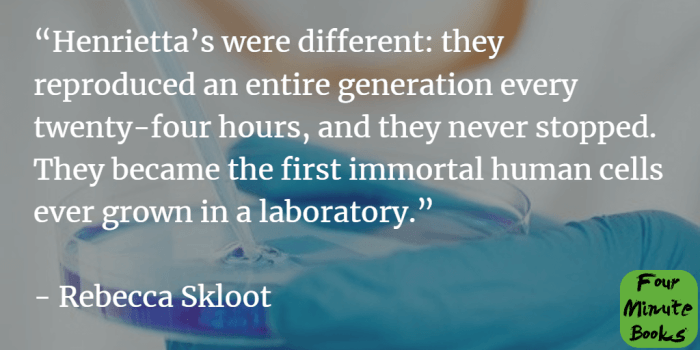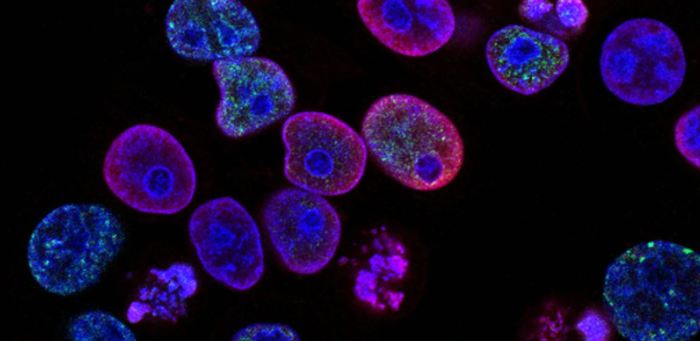The immortal life of henrietta lacks book chapter summary – The Immortal Life of Henrietta Lacks: A Book Chapter Summary provides an overview of Rebecca Skloot’s nonfiction book, which explores the life of Henrietta Lacks, an African American woman whose cells were taken without her consent and used for medical research.
This chapter summary delves into the ethical implications of Henrietta Lacks’ case, the impact on her family, and the ongoing debate over the ownership and control of her cells.
1. Introduction
The “Immortal Life of Henrietta Lacks” tells the extraordinary story of a young African American woman whose cells were taken without her consent and used for medical research, leading to groundbreaking advancements in medicine. Henrietta Lacks’ story highlights the ethical implications of medical research and the importance of patient rights.
2. Henrietta Lacks’ Life and Legacy: The Immortal Life Of Henrietta Lacks Book Chapter Summary

Henrietta Lacks’ Background
Henrietta Lacks was born in 1920 in Roanoke, Virginia. She was the daughter of sharecroppers and had a difficult childhood, marked by poverty and limited education. She married young and had five children.
Unauthorized Cell Harvesting
In 1951, Henrietta Lacks was diagnosed with cervical cancer and treated at the Johns Hopkins Hospital. During her treatment, her cells were taken without her knowledge or consent and used for medical research. These cells, known as HeLa cells, became the first immortalized human cell line and have been used in countless medical advancements.
Ethical Implications, The immortal life of henrietta lacks book chapter summary
The unauthorized harvesting of Henrietta Lacks’ cells raised important ethical questions about patient rights and informed consent. Her case led to the development of stricter regulations governing medical research and the requirement for informed consent from patients.
3. The HeLa Cells

Unique Characteristics
HeLa cells are unique in that they are immortal, meaning they can reproduce indefinitely in culture. This characteristic has made them invaluable for medical research, as they provide a continuous supply of cells for experiments.
Medical Advancements
HeLa cells have been used to develop vaccines, drugs, and other medical advancements. They have played a crucial role in the development of the polio vaccine, cancer treatments, and genetic research.
Ownership and Control
The ownership and control of HeLa cells has been a subject of ongoing debate. Henrietta Lacks’ family has argued that they should have some control over the use of her cells and share in the profits generated from their use.
4. The Impact on Henrietta Lacks’ Family

Emotional Impact
Henrietta Lacks’ death in 1951 left a profound emotional impact on her family. They were devastated by her loss and struggled to come to terms with the fact that her cells were being used without their knowledge or consent.
Financial Impact
The Lacks family has also faced financial challenges due to Henrietta’s unauthorized cell harvesting. They have received no compensation for the use of her cells, despite the billions of dollars generated from their use.
Efforts for Justice
The Lacks family has been vocal in their efforts to seek justice and compensation for Henrietta’s exploitation. They have filed lawsuits and worked with organizations to advocate for patient rights and informed consent.
5. Social and Ethical Implications
Informed Consent
Henrietta Lacks’ story highlights the importance of informed consent in medical research. Patients have the right to know how their tissues and cells will be used and to give their consent before any procedures are performed.
Patient Rights
Henrietta Lacks’ case also raises questions about patient rights and the protection of vulnerable populations. It is essential that medical research is conducted ethically and that the rights of patients are respected.
Race and Poverty
The fact that Henrietta Lacks was a poor African American woman has played a significant role in her story. Her experience reflects the historical exploitation of marginalized communities in medical research.
Expert Answers
Who was Henrietta Lacks?
Henrietta Lacks was an African American woman whose cells were taken without her consent and used for medical research.
What are HeLa cells?
HeLa cells are a line of immortal cells that were taken from Henrietta Lacks’ cervix in 1951.
What are the ethical implications of Henrietta Lacks’ case?
Henrietta Lacks’ case raises important questions about informed consent, patient rights, and the role of race and poverty in shaping medical research.